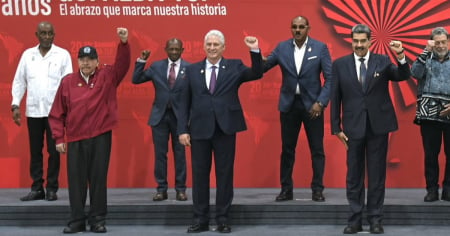In an attempt to reaffirm his leadership amid the worst economic crisis the country has faced, Cuban leader Miguel Díaz-Canel announced the holding of a "March of the Fighting People" on December 20, following the closure of the National Assembly of People’s Power session.
"Yes, there is a blockade, yes, the blockade has intensified, yes, there is economic warfare, yes, we are despised, yes, we are vulgarly and obscenely poisoned with hatred on social media... In response to this hostile political design being implemented, we call upon the heroic Cuban people to a combat march on December 20," said the First Secretary of the Communist Party of Cuba (PCC).
His proposal, made during the closing speech of the IX Plenary of the Central Committee of the PCC, which took place this Friday in the air-conditioned halls of the so-called "Palace of the Revolution," reflected the "continuity" of his government and the strategy of distraction that, according to theorist Noam Chomsky—who is highly regarded by the Castro regime—consists of diverting the public's attention from essential issues as a fundamental element of social control.
A propaganda event devised by the Great Dictator
The "March of the Combatant People" is a concept that dates back to 1980, when dictator Fidel Castro organized massive demonstrations to suppress those seeking asylum at the Peruvian embassy, marking the beginning of the Mariel exodus.
Those demonstrations were marked by violence instigated by the regime's institutions, acts of repudiation, and slogans such as "We don't want them, we don't need them," "Pin pon out, down with the worm infestation," and "Get the scum out!" This established a dark precedent in Cuba's historical memory.
Orchestrated through large forced mobilizations of military personnel, workers, and students, these marches— which require scarce resources in Cuba, such as public transportation and fuel—have been designed as propaganda events that typically do not attract the children and privileged members of the communist elite.
"Continuity" appeals to propaganda amid the crisis
During his speech, Díaz-Canel resorted to a discourse filled with slogans, repeatedly making the usual accusations against the United States and justifying the internal crisis by pointing to the "criminal and genocidal blockade."
However, his words did not include concrete proposals to address the serious economic problems facing Cubans, ranging from shortages to constant blackouts.
Díaz-Canel appealed to "creative resistance" and stated that they will move forward "by enhancing development programs" through "innovation and hard work." However, he acknowledged that the government’s plan to revitalize the economy has not produced satisfactory results.
For his part, Prime Minister Manuel Marrero Cruz acknowledged that there is a "widespread dissatisfaction" due to a lack of coordination and efficiency in implementing corrective measures.
In this context, analysts view the call for the march as a strategy to divert attention from the government's management and to project an image of unity and resistance to the international community.
Without effective solutions to the crisis impacting the island, the government appears to once again choose propaganda symbolism over addressing the structural issues affecting millions of Cubans.
Filed under:
